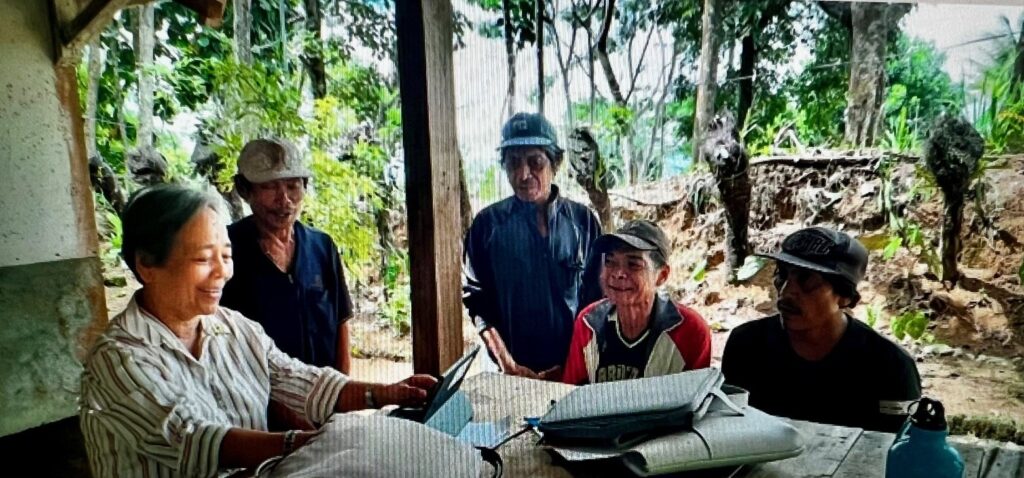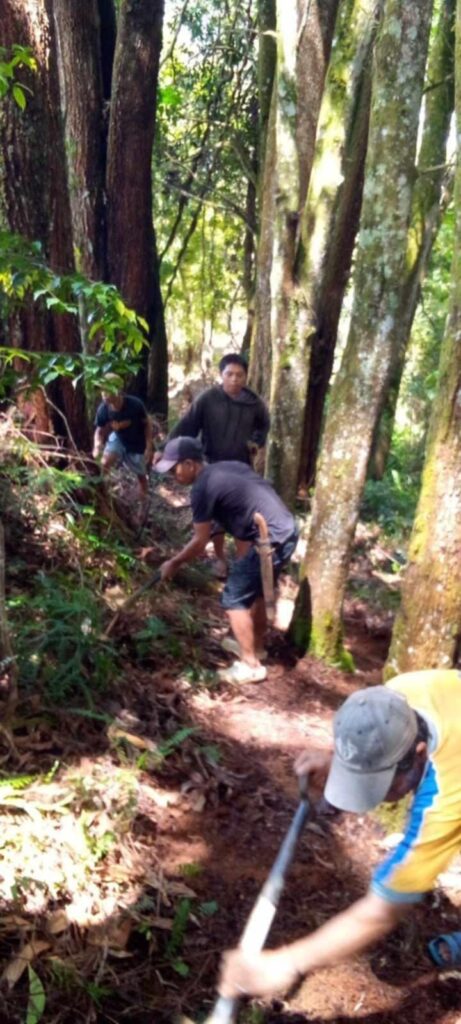As we prepare to celebrate the 10th anniversary of Pope Francis’ Laudato Si’ encyclical on May 24, the important teaching urging care for our common home, we invite the Mercy community to deeper engagement through stories showcasing how sisters and others have responded to the encyclical. Their inspiring stories are part of the Institute’s participation in the Jubilee Year, when Pope Francis calls us to be Pilgrims of Hope.
By Sister Virgencita “Jenjen” Alegado, RSM
Accompanying the Subanen people in the Philippines as they heal their indigenous culture, community and land moves me deeply. I’m grateful beyond measure to the late Pope Francis for being the bridge that brought us together.
On this 10th anniversary of Laudato Si’ I cannot stop praising God – the words literally mean “Praise be to you, my Lord.” I have witnessed firsthand how the encyclical has inspired a mutual life-giving partnership between this indigenous people and the Sisters of Mercy’s Holy Cross High School in the Mindanao region of the southern Philippines.
I first encountered the Subanen in the early 2000s during an assembly of sisters who partner with people on the margins and care for creation. Their name derives from “Suba” or river and speaks to their connection to the natural world. Hearing directly from the indigenous people about their struggles for survival and their desire for cultural wholeness amid displacement and death, disempowerment and colonization broke my heart and moved me to connect with them.

I was then the campus minister at Holy Cross High School and guided students on exposure programs in the indigenous community. The Subanen people welcomed us and were generous to us even in their scarcity. The experience was life-changing for the students as they saw firsthand that the realities of the indigenous people were very different from what they had previously learned. I grew in my desire to help them.
When Pope Francis published Laudato Si’ in 2015, I was Holy Cross School’s director and felt strongly that our response to the encyclical must include the Subanen and their needs. The school community was already dedicated to the Sisters of Mercy’s mission of caring for Earth and building a just, peaceful world, and we felt called by the encyclical’s pleas to connect the exploitation of the environment with that of the indigenous people.
As Pope Francis noted, “It is essential to show particular concern for indigenous communities and their cultural traditions … For them, land is a gift from God and from their ancestors who rest there … Nevertheless …pressure is being put on them to abandon their homelands to make room for agricultural or mining projects which are undertaken without regard for the natural and cultural degradation.” (Laudato Si’ 145-146)

Laudato Si’ inspired me to put into further action what had become my passion: “to listen to the cry of the Earth and the cry of the poor” as the encyclical implores of us all. As part of the 2023-2024 cohort of the Mercy Emerging Leadership Fellow (MELF) program – a program for women who are passionate about advancing mercy and justice – I chose for my project a new kind of partnership between Holy Cross High School and the Subanen.
Working with Sister Eva Castro, RSM, our campus minister, and Jonel Baba, a lay partner, as well as our school’s environmental club, we joined with the indigenous people to create GPK Gulangan Pekpongonan Katutubuan Association (“A Forest Where the Tribe Unites.”)
We organized 32 families to work together to improve a reforested area that the Sisters of Mercy and the Subanen had planted and nurtured over the years. One of our objectives was to help the indigenous people build a sustainable livelihood and at the same time claim back their dignity and culture.
As the project got underway, the Subanen’s cultural value of communal work and sharing was very much alive. They spoke their own dialect, a language whose usage had been dwindling due to pressures to integrate with the larger society, using it when they got together on Sunday afternoons and planted vegetables, abaca (a banana species whose fiber is used for making rope, paper and textiles) and fruit trees. They also raised chickens, goats, rabbits and ducks. New friendships developed between the indigenous people and the Holy Cross High School community.
Along with a heightened awareness among the Subanen of their rights, responsibilities and culture have come other blessings. Other people, organizations and schools have begun to come to the area to partner with the indigenous people and to learn from them how to respond to the call of Laudato Si’. These newcomers have also helped with the planting of crops and other projects. Seeing these mutually respectful and beneficial interactions among people from different backgrounds is a source of hope and inspiration in this Jubilee Year.